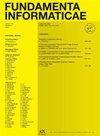缺陷零Petri网和产品形式
IF 0.4
4区 计算机科学
Q4 COMPUTER SCIENCE, SOFTWARE ENGINEERING
引用次数: 33
摘要
考虑一个带有种族政策的马尔可夫Petri网。如果查看给定标记的概率可以分解为仅依赖于局部标记的项的位置的乘积,则标记过程具有“产品形式”平稳分布。首先,我们观察到Feinberg的亏缺零定理,为化学反应网络的存在提供了一个结构的和简单的充分条件。鉴于此,我们研究了自由选择网的经典子类。粗略地说,我们表明该类中唯一具有乘积形式的Petri网是状态机,它可以被视为Jackson网络。本文章由计算机程序翻译,如有差异,请以英文原文为准。
Deficiency Zero Petri Nets and Product Form
Consider a Markovian Petri net with race policy. The marking process has a “product form” stationary distribution if the probability of viewing a given marking can be decomposed as the product over places of terms depending only on the local marking. First we observe that the Deficiency Zero Theorem of Feinberg, developed for chemical reaction networks, provides a structural and simple sufficient condition for the existence of a product form. In view of this, we study the classical subclass of free-choice nets. Roughly, we show that the only Petri nets of this class which have a product form are the state machines, which can alternatively be viewed as Jackson networks.
求助全文
通过发布文献求助,成功后即可免费获取论文全文。
去求助
来源期刊

Fundamenta Informaticae
工程技术-计算机:软件工程
CiteScore
2.00
自引率
0.00%
发文量
61
审稿时长
9.8 months
期刊介绍:
Fundamenta Informaticae is an international journal publishing original research results in all areas of theoretical computer science. Papers are encouraged contributing:
solutions by mathematical methods of problems emerging in computer science
solutions of mathematical problems inspired by computer science.
Topics of interest include (but are not restricted to):
theory of computing,
complexity theory,
algorithms and data structures,
computational aspects of combinatorics and graph theory,
programming language theory,
theoretical aspects of programming languages,
computer-aided verification,
computer science logic,
database theory,
logic programming,
automated deduction,
formal languages and automata theory,
concurrency and distributed computing,
cryptography and security,
theoretical issues in artificial intelligence,
machine learning,
pattern recognition,
algorithmic game theory,
bioinformatics and computational biology,
quantum computing,
probabilistic methods,
algebraic and categorical methods.
 求助内容:
求助内容: 应助结果提醒方式:
应助结果提醒方式:


